From his battles with "Crazy Joe" Gallo to his shocking shooting at a public rally right in the middle of New York City, Colombo Family crime boss Joe Colombo died as dramatically as he lived.
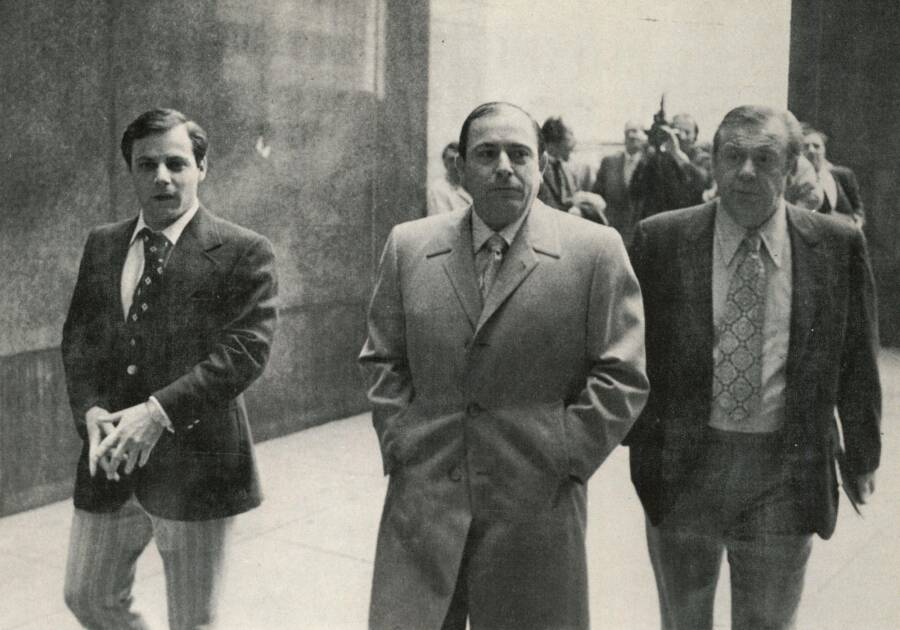
colaimages/Alamy Stock PhotoMob boss Joe Colombo (center) with his son Joe Jr. in the 1950s.
Joseph Colombo was once the head of the Colombo Family, one of the New York City Mafia’s Five Families. A force to be reckoned with, Colombo helped navigate the family through gang wars and butted heads with his infamous rival “Crazy Joe” Gallo.
During his reign, Joe Colombo brought an end to the First Colombo War, became involved in Italian-American civil rights activism, and even helped shape the production of The Godfather. But in the end, a 1971 assassination attempt would render Colombo unable to lead the family — and result in his untimely death years later.
Joe Colombo’s Early Years On The Tough Streets Of Brooklyn
Born on June 16, 1923 in Brooklyn, New York, Joseph Colombo Sr. grew up in the world of underground crime. His father, Anthony Colombo, was reportedly a member of the Profaci Crime Family led by Giuseppe “Joe” Profaci.
In 1938, Anthony and his girlfriend were found strangled to death in Anthony’s vehicle. It’s likely this event had a scarring impact on Joe, who was just a teenager at the time.
Otherwise, not much is known about Joe Colombo’s upbringing. He attended high school in Brooklyn for two years before dropping out to join the U.S. Coast Guard. He served for three years, but was discharged in 1945 after being diagnosed with neurosis.
Afterward, Colombo worked in a variety of jobs, including stints as a dockworker, meat salesman, and a real estate salesman. Through these positions, he began to forge connections with members of New York City’s criminal underworld.
In 1944, Colombo married Lucille Faiello and soon started building their family in Brooklyn. From an outsider’s perspective, Colombo seemed to be an average working man. But his connections to the Mafia would prove to be too much of a temptation for the young and ambitious Colombo to pass up.
Colombo Climbs The Ranks Of The New York City Mafia
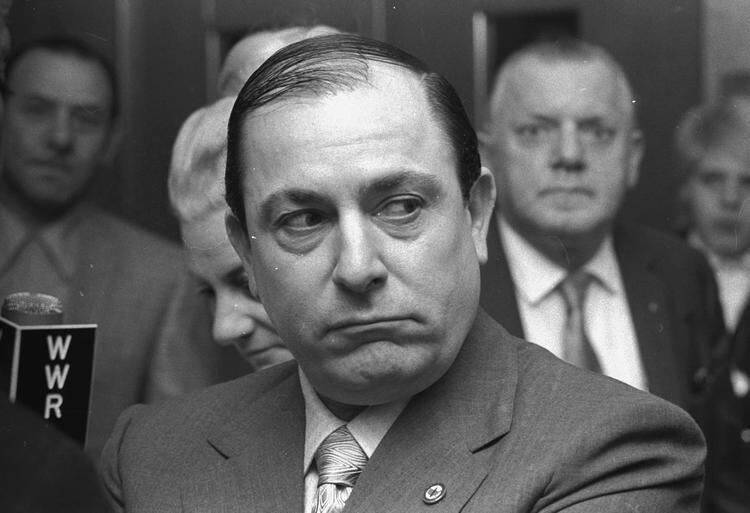
American Mafia HistoryJoe Colombo reportedly served as inspiration for the character Joey Zasa, a villain in The Godfather Part III.
Before long, Joe Colombo had followed in his father’s footsteps, joining the Profaci Crime Family. As an enforcer, he was charged with imposing the mob’s laws, often through violent means.
He proved to be a successful and loyal family member, gradually rising through the ranks of the Mafia until he became a capo. Meanwhile, tensions were brewing within the group.
In the 1950s, Profaci hitman Joe Gallo began revolting against the gang’s leadership. Believing they weren’t getting a fair cut of the group’s profits, he and several accomplices kidnapped four of the gang’s top members on Feb. 27, 1961. In doing so, they sparked a bloody civil war within the gang known as the First Colombo War.
A Mafia War Breaks Out In New York City
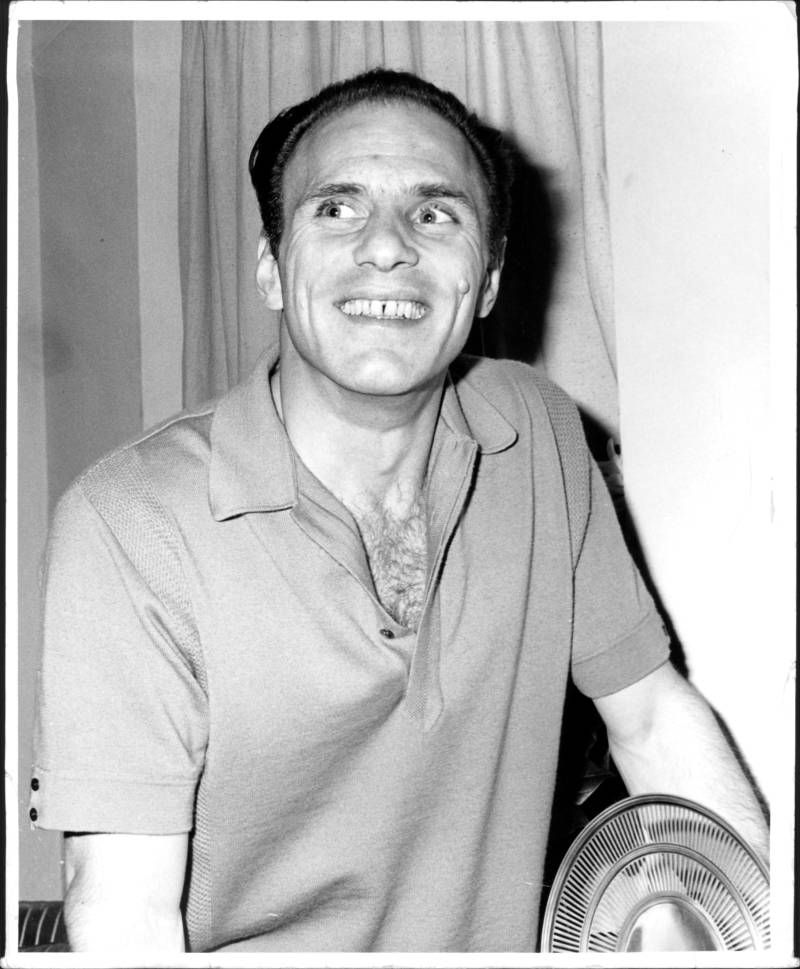
Getty ImagesCrazy Joe Gallo, a capo who waged a gang war within the Colombo Crime Family and may have plotted Joe Colombo’s death.
The conflict had two sides: Joe Gallo and his accomplices, and Profaci Family loyalists. In the ensuing years, both sides put out a string of hits on each other.
One of Gallo’s crew members, Joseph “Jelly” Gioielli, disappeared in 1961. His clothing, stuffed with a dead fish, was dumped in front of a bar the Gallos regularly visited. Joe Gallo’s own brother Larry Gallo almost met his end when Profaci hitmen attempted to strangle him in the Sahara club, but the police intervened.
Joe Colombo, a Profaci loyalist, had his own close shave in July 1963. TIME reports that the Gallos planned to attack him on his route home from his country club, but he got wind of the plot and took another way home.
When Joe Gallo was arrested for extortion in 1961 and subsequently sentenced to seven to 14 years in prison, it seemed as though the conflict would die out. But the ceasefire wouldn’t last long. The war ultimately resulted in at least nine murders and three disappearances.
Things began to shift after Joe Profaci died of cancer in 1962, leaving underboss Joe Magliocco in charge. The following year, Profaci Family ally Joseph Bonanno sought a new alliance with Magliocco.
Bonanno had grand plans to assassinate Carlo Gambino and Thomas Lucchese, the heads of two other crime families, and take over as leader. Magliocco readily agreed to the plan, and enlisted capo Joe Colombo to plan the murders. Seeing a window of opportunity, Colombo instead turned on his bosses and revealed the plot to Gambino.
Fearing retribution from the Mafia Commission, Bonanno went into hiding while Magliocco pleaded for forgiveness. As punishment, the Commission removed Magliocco as head of the Profaci Crime Family — and appointed Joe Colombo in his place as repayment for his loyalty.
Joe Colombo Becomes Boss Of The Colombo Family
At only 41 years old, Joe Colombo became the youngest Mafia boss in the city — and he took his role seriously. Renaming the family after himself, he lost no time reorganizing its internal structure. As boss, he led as many as 200 men in criminal activities like loan-sharking, extortion, and narcotics dealings.
Most importantly, Colombo ended the First Colombo War by creating a peace treaty between the family and Gallo’s supporters.
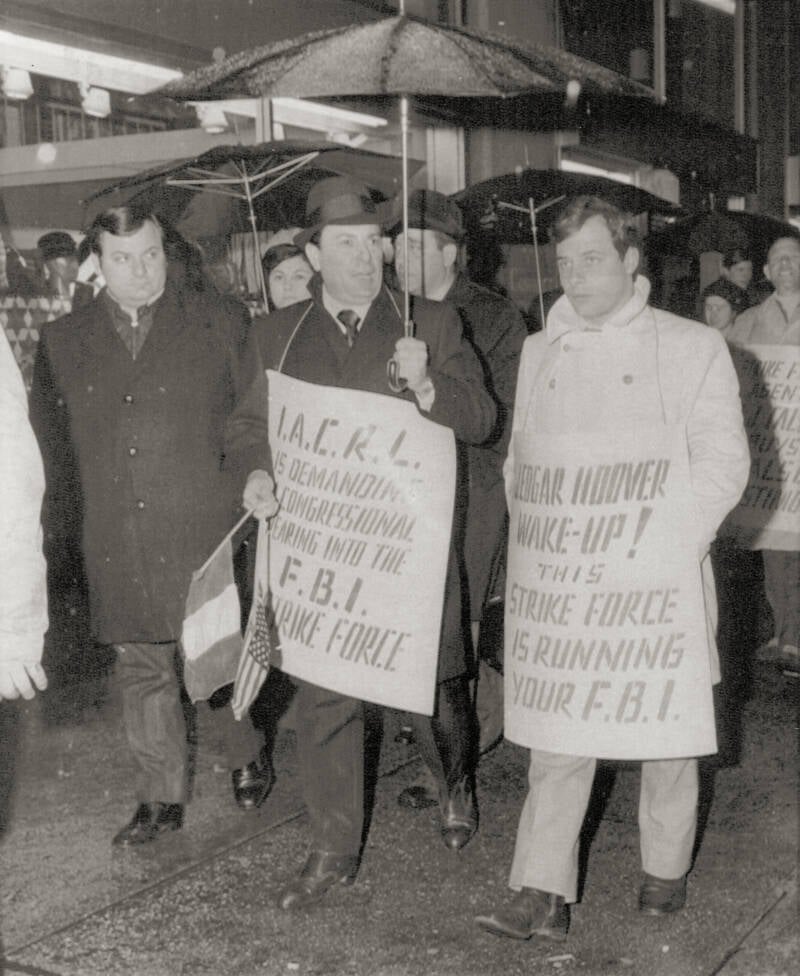
John Binder CollectionJoe Colombo with his sons, Anthony (left) and Joseph Jr. (right), picketing the FBI headquarters in New York as part of a 1971 Italian-American Civil Rights League demonstration.
Finally, with the family conflict settled, Joe Colombo was able to focus on other matters. He dived into the world of activism, creating the Italian-American Civil Rights League in April 1970 to fight discrimination against Italian Americans — and to deter the government from investigating his criminal activities.
“The purpose of the League is similar to that of B’nai B’rith’s Anti-Defamation League,” the League’s statement read. “We want to be another and a very strong civil rights group. We’re not going to limit our help to any group. Anyone who wants our assistance will get it.”
At the height of his reign, Joe Colombo was so powerful that he almost managed to shut down the production of Francis Ford Coppola’s 1972 mob drama The Godfather. Believing the movie would perpetuate negative stereotypes about Italian Americans, Colombo initially threatened to use his influence to shut the project down.
When the film’s producer met with Colombo to try to change his mind, Colombo agreed not to disrupt production — as long as any mention of the words “Mafia” or “Cosa Nostra” were struck from the script and the production donated proceeds from the premiere to the Italian-American Civil Rights League.
But not everyone in the Mafia approved of his activism. Many worried it called too much attention to their community and would result in government crackdowns on their activities. Even the Commission began to disapprove of Colombo’s work.
Still, Joe Colombo continued to hold rallies and organize events for the organization. On the surface, everything in the Colombo Family seemed to be operating smoothly.
That is, until Joe Gallo was released from prison.
A Dramatic Shooting Threatens Joe Colombo’s Life
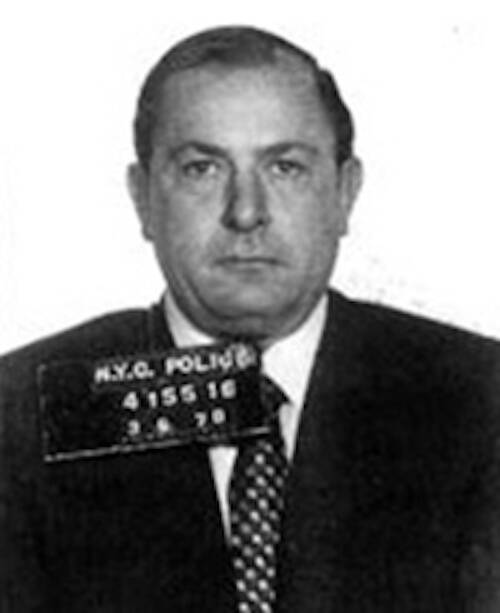
Public domainA mugshot of Joe Colombo from 1970.
Upon his release in 1971, Joe Gallo met with members of the Colombo Family, who warned Gallo that a peace treaty had been established between the family and Gallo’s old crew. However, Gallo argued that the treaty was void since he’d been in prison at the time, and refused to uphold it.
Trouble was brewing for Joe Colombo. But that didn’t stop him from continuing about his business.
On June 28, 1971, Colombo held an Italian Unity Day rally with his Italian-American Civil Rights League. He was preparing to speak when a gunman suddenly emerged from the crowd and shot him three times in the back of the head. Carried out in broad daylight and in front of countless witnesses, it was one of the most brazen mob hits in history.
“They got Colombo!” the crowd reportedly screamed, according to a 1971 New York Times article.
The crowd grabbed Joe Colombo’s assailant, a Black man named Jerome Johnson. Amid the chaos, Johnson was shot and killed by an unknown gunman moments after the attack took place.
The police immediately suspected that the attack was Mafia-related. While many suggested that Joe Gallo had hired Johnson to kill Colombo, investigators were never able to trace the attack back to Gallo or any other member of New York’s crime families. About nine months later, on April 7, 1972, an unknown Mafia hitman shot Joe Gallo dead while he was eating at Umbertos Clam House in Little Italy.
The Untimely Death Of Joe Colombo
Joe Colombo’s death was a slow one. Doctors were able to save Colombo’s life, but he was left paralyzed and semi-comatose. For the next seven years, Colombo lived in his Brooklyn home in poor health.
Meanwhile, the assassination attempt fueled further bloodshed between the Gallos and the Colombo Family in what became known as the Second Colombo War.
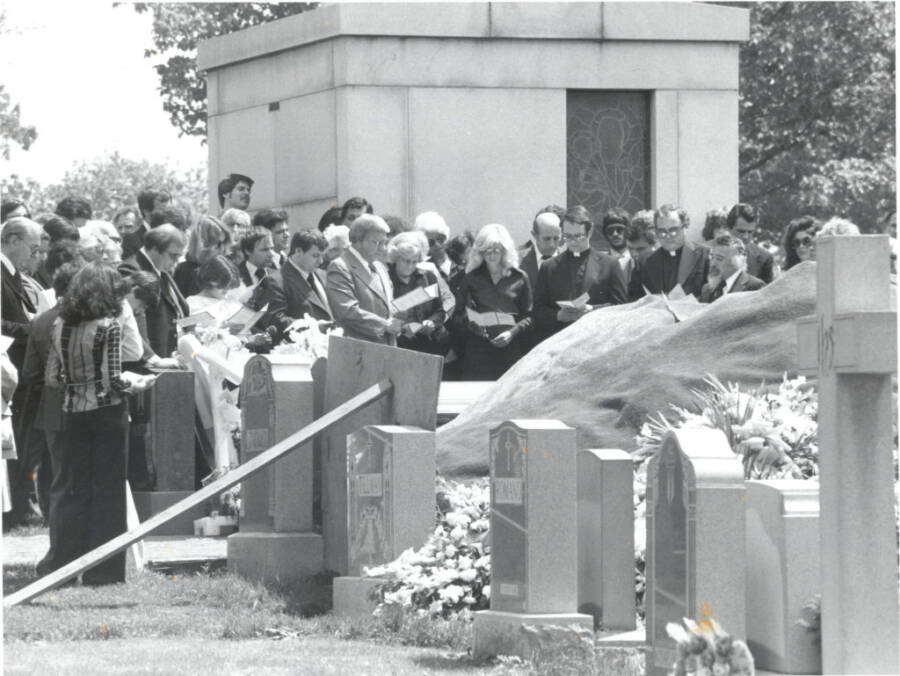
Christian CipolliniAttendees gather for a funeral after Joe Colombo’s death.
On May 22, 1978, 54-year-old Joe Colombo died of complications resulting from the shooting at St. Luke’s Hospital in Newburgh, New York. Loved ones held a funeral for Colombo at St. Bernadette’s Catholic Church in Brooklyn and later buried him at the St. John’s Cemetery in Queens.
To this day, Joe Colombo is remembered as one of history’s most powerful mob bosses. He even reportedly served as inspiration for the character Joey Zasa, a villain in The Godfather Part III (1990) who tries to have Michael Corleone killed. Indeed, Zasa’s murder on the streets of New York during the Feast of San Gennaro is eerily similar to the way in which Colombo was shot.
After reading about the life and death of Joe Colombo, dive into the story of omertà, the Mafia’s code of silence. Then, read about infamous Colombo mobsters Carmine Persico and Sonny Franzese.





